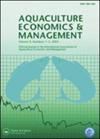美国鲶鱼集约化生产系统中的生产经济关系
IF 3.7
2区 经济学
Q1 AGRICULTURAL ECONOMICS & POLICY
引用次数: 4
摘要
美国鲶鱼产业正在通过采用集约化养殖方式发展,如密集曝气池塘和分池系统。基于2010 - 2018年143个池塘的商业鲶鱼产量数据,分析了这些集约化系统中鱼类产量与关键生产投入之间的函数关系。对密集曝气池采用Cobb-Douglas生产函数,对分段曝气池采用改进的超对数生产函数来定义生产关系。结果表明,放养时鱼种大小、放养密度、曝气率、投食率、成活率和收获量是影响强化曝气池鱼类产量的显著变量。初始鱼种生物量(放养规模与放养密度的交互作用)、饵料系数(FCR)、饵料率和池塘规模是影响分池系统产量的最重要变量。在两个模型中,采食量和放养生物量是显著变量。这两项生产职能都表明,在使用投入物以增加产量方面,特别是在饲料管理方面,还有进一步改进的余地。本文章由计算机程序翻译,如有差异,请以英文原文为准。
Production economic relationships in intensive U.S. catfish production systems
Abstract The U.S. catfish industry is evolving by adopting intensive farming practices such as intensively aerated ponds and split-pond systems. The functional relationship between fish yield and key production inputs in these intensive systems was analyzed based on commercial catfish production data from 143 pond observations (2010−2018). A Cobb-Douglas production function was employed for the intensively aerated ponds and a modified translog production function was used to define the production relationships in split ponds. Results indicated that the size of fingerlings at stocking, stocking density, aeration rate, feeding rate, survival, and harvest size of the fish were statistically significant variables influencing fish production in intensively aerated ponds. Initial fingerling stocking biomass (interaction of stocking size and stocking density), feed conversion ratio (FCR), feeding rate, and pond size were the most important variables influencing production in split-pond systems. Feed fed, as well as stocking biomass, were the significant variables found in both models. Both production functions indicated further scope for improvement in the use of inputs to increase production, especially in feed management.
求助全文
通过发布文献求助,成功后即可免费获取论文全文。
去求助
来源期刊

Aquaculture Economics & Management
FISHERIES-
CiteScore
7.30
自引率
17.90%
发文量
21
期刊介绍:
Aquaculture Economics and Management is a peer-reviewed, international journal which aims to encourage the application of economic analysis to the management, modeling, and planning of aquaculture in public and private sectors. The journal publishes original, high quality papers related to all aspects of aquaculture economics and management including aquaculture production and farm management, innovation and technology adoption, processing and distribution, marketing, consumer behavior and pricing, international trade, policy analysis, and the role of aquaculture in food security, livelihoods, and environmental management. Papers are peer reviewed and evaluated for their scientific merits and contributions.
 求助内容:
求助内容: 应助结果提醒方式:
应助结果提醒方式:


